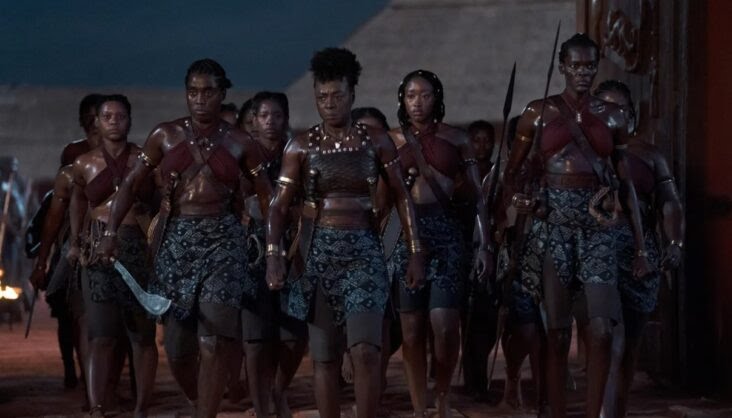Hollywood’s narratives about Africa come with controversies. Sometimes it could be about historical inaccuracies of a movie or why actors who are not ‘originally’ from the continent should not tell African stories.
The Woman King movie is not an exception.Directed by Gina Prince-Bythewood, it is a 2022 American historical epic film that follows the story of the Agojie — the all-female warrior unit that protected the West African kingdom of Dahomey, now known as the Republic of Benin.The Woman King easily topped the box office chart and earned over $19m after making its world premiere at the Toronto Film Festival.
The movie, written by Dana Stevens and based on a story co-authored by Maria Bello, has been regarded by some as an exceptional cinematic masterpiece. Some echo that representations in the storyline amplify the fact that stereotypes can be broken.However, the movie has been criticised for hiding Dahomeys’ participation in the transatlantic-slave trade between 1715 and 1850 and suggesting that Dahomey was an anti-slavery kingdom when it certainly was not.
Many Africans say the filmmakers were only trying to reframe the gory past of the Agojie and downplay the involvement of African slave traders. The movie portrays the Agojie as freedom fighters, but history has it that they were just ordinary soldiers who captured and sold slaves.
Criticism of the film has flooded social media, especially Twitter. Some even had the effrontery to call for a total ban on the movie. #BoycottTheWomanKing has become an increasing trend on Twitter.Twisting African history?The movie actually attempted to twist African history and people should stop making a business out of selling twisted African narratives.
However, rather than cancel the movie, Africans should learn how to tell their own stories by themselves.When Africans don’t tell their stories through their lens, then they shouldn’t expect Hollywood to offer anything special about Africa except fictionalised narratives. Africa’s history doesn’t need to be fictionalised – the continent deserves stories more than simplified accounts of poverty and wars.
There’s a need to tell our own stories from our own angle with authenticity. If we don’t, Hollywood and other foreign filmmakers will help us tell them, and when they do so they will do it with their own twist.Neglecting African historyBefore the release of the movie, I had never heard of the Agojie. I had no idea that some time back in West Africa, where I come from, there was anything such as an all-female military regiment that once fought wars. Indeed, the role they played in the slave trade is worthy of condemnation.
However, I never even imagined that African women were fighters.In the accounts that I read at that time, pre-colonial African women were depicted as mere housewives and properties of pleasure. I was never introduced to anything remarkable about them.Interestingly, I only learned about the kingdom of Dahomey in secondary school when I was told it was just a name given to the present Republic of Benin. There was indeed a lack of in-depth knowledge about Africa in all the lessons I received about the continent in school.
Come to think of it, I never attended a history class because there wasn’t any when I was in secondary school.Since it was Hollywood that first began to shed light on the history of Africa that we silently ignored, shouldn’t I then appreciate the controversies the movie raises?I love the controversies and the questions the movie has raised. I treasure the fact that it is reawakening the consciousness of young Africans to learn how to separate fact from fiction.The growing anger and frustration should not fizzle out on Twitter.
This should inspire the various indigenous movie industries in Africa to create stories that will truly reflect the real image of our precolonial times. Rather than waiting for Hollywood to tell our stories, why can we not tell our stories by ourselves.‘Amplify our stories’The average educated African would rather choose to have in-depth discussions about Christopher Columbus, the Italian explorer who allegedly discovered a continent that was not hidden, or Mungo Park — the young man who was said to have found a river that was never lost, than talk about feats accomplished by their ancestors.
Shouldn’t we amplify stories about powerful ancient civilisations that once flourished throughout the continent like the prehistoric Land of Punt and the Kingdoms of Aksum and Nubia in northeast Africa; the West African empires of the Ashanti, Mali, and the Songhai; and the Kingdom of Zimbabwe?Shouldn’t we produce comic books and cartoons telling of Ana Nzinga, queen of Ndongo; Kongo prophet Dona Beatriz; Queen Amina, and others?If we want others to stop pushing false and damnable narratives about our continent, then we must be willing to appreciate our own histories.
This then begs the question: Should we cancel The Woman King?It is […] best viewed with an awareness of its extensive alterations.
I agree with Dominique Somda, a junior research fellow at the Institute for Humanities in Africa in Cape Town, who says:“The Woman King should be seen for its spectacular celebration of the Agodjie strength and its invitation to explore their meaningful, public, and intimate lives and also for — rather than despite — the political and ethical conundrums it occasions. It is, however, best viewed with an awareness of its extensive alterations.”
